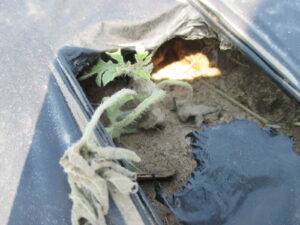In early May, we had an extended cold period with daily average air temperatures in the 50s°F. Min temperatures are in the 40s°F, some nights even upper 30s°F. In most areas in southern Indiana, it is fortunate we did not encounter a frost with temperature dropped below 32°F, but the low temperature for the extended period has brought trouble to early planted melon plants, a phenomenon called chilling injury. What growers observed is widespread plant wilt in the newly planted field. In less severe conditions, old leaves die or show symptoms, while growth points stay green (Figure 1). In more severe cases, entire plants were wilting and then dead. This is not an unusual observation that happened in early May in watermelon and cantaloupe production in southern Indiana. If I remember correctly, this happened in 2020, 2019 and 2017 in the past five years.
The reason plants wilt is because cool roots lack hydraulic conductivity that substantially inhibits water uptake from the soil. The wilt is more dramatic under sunny and windy conditions, as the less humid condition encourages water loss on the leaf surface. Plants recover from wilting if the low-temperature period did not last long and roots regain the capability to take up water, but keep in mind it takes a longer time for the soil to warm up than air. Another issue that can cause newly planted seedlings wilt is insect damage, please read the next article in this issue from Elizabeth Long about seed corn maggot.
Why do plants wilt in some fields, but not others?
A slight temperature variation could make a difference. So factors such as where the field is, the topography of the field, whether row covers are used all play a role. Another important thing to consider is the physiological stage of the seedlings. Transplants grow roots first when planted in the field. So even plants that look about the same size from above ground, may have differences in root establishment. Clearly, the plants with more extensive root growth are more tolerant to low-temperature stress.
Do cucurbit species and cultivars make a difference?
Evidence shows watermelon is more tolerant to chilling injury than cantaloupe and cucumber; cantaloupe is intermediate, and cucumber is the most susceptible to chilling injury. Within the same species, genetic variation exists. Unfortunately, such information is often not included in cultivar descriptions. Grafting makes a difference too. Grafted watermelon plants on either hybrid squash rootstock or citron rootstock are more tolerant to chilling injury than non-grafted watermelon plants. Comparing between the two rootstocks, hybrid squash rootstock is more cold tolerance than the citron rootstock.
More information about this topic can be found in a video and a previous newsletter article
When to plant watermelons https://www.youtube.com/watch?v=tHT2mAnNRWk&t=144s
Low temperature caused watermelon establishment failure https://vegcropshotline.org/article/low-temperature-caused-watermelon-establishment-failure/
